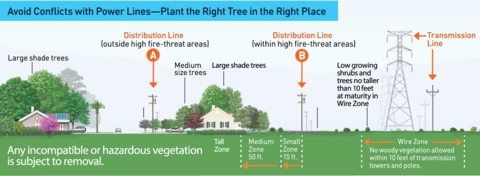Help Promote Safety by Planting the Right Tree in the Right Place as Part of California Arbor Week
Help Promote Safety by Planting the Right Tree in the Right Place as Part of California Arbor Week
PG&E offers resources for California Arbor Week, March 7-14, for the whole family
SAN FRANCISCO--(BUSINESS WIRE)--Planting the right tree in the right location helps promote fire safety, natural gas safety, reduces power outages and ensures beauty for years to come. That’s why each year, Pacific Gas and Electric Company (PG&E) likes to recognize and honor trees during California Arbor Week. To kick off the weeklong event starting today, we are reminding customers and their loved ones of all ages to mind what’s overhead and underground when adding new trees or shrubs to an area. This will lower the risk of wildfires or damage to powerlines and gas lines, making our hometowns safer.
PG&E has many online materials, including free downloadable guides, with easy tips, charts and photos that help explain how, what, and where to plant the safest trees for each area, located at pge.com/RightTreeRightPlace.
It’s never too early to learn about trees and powerline safety, so PG&E also has fun and educational games, puzzles, and checklists just for kids at pge.com/arborday4kids. Each activity is grade and age appropriate.
“California Arbor Week reminds us that trees provide many health and environmental benefits to our hometowns but there are hazards to avoid above and below the ground. Trees that are small when planted may grow to heights that can reach overhead powerlines or create root systems that interfere with gas lines. We want your trees to be healthy and safe for our communities to enjoy for a long time,” said Peter Kenny, Senior Vice President, PG&E Vegetation Management & System Inspections.
Here are some main safety reminders when it comes to planting a tree, but more robust information can be found in PG&E’s free downloadable planting guides, which includes characteristics of recommended trees, how to care for a tree, and much more.
WHAT TO DO BEFORE PLANTING
- Call 8-1-1 at least two days before planting trees or landscaping to have underground powerlines and other utilities marked. You can also do this by visiting http://www.811express.com. Professional locators will arrive at the digging site to mark the approximate locations of underground utilities with flags, spray paint or both.
- Visit pge.com/righttreerightplace for planting guidelines specific to your region and specific to whether you live in a High Fire-Threat District (HFTD), as outlined by the California Public Utilities Commission.
DURING PLANTING
- When planting a new tree near powerlines outside of a HFTD, leave space for it to remain at least 10 feet clear of all powerlines throughout its lifespan, including crown expansion and ensure it is no taller than 25 feet at maturity.
- Within a HFTD, plant only low-growing, fire-resistant shrubs near powerlines. This can extend the defensible space around your property. For more information regarding defensible space visit www.readyforwildfire.org.
ENJOY YOUR TREE
- Never attempt to retrieve any type of balloon, kite, drone, or toy that becomes caught in a tree that is near a powerline. Trying to retrieve it yourself is extremely dangerous. Leave it alone, and immediately call PG&E at 1-800-743-5000 to report the problem.
- Always look up before pruning a tree. Only experts certified to conduct tree work near powerlines are qualified to prune trees in these locations.
In 2011, the California Legislature designated the week of March 7 to March 14 of each year as California Arbor Week, and to urge California residents to observe the week with appropriate tree planting activities and programs. March 7 is the birthday of famed horticulturist Luther Burbank.
For information on all PG&E’s vegetation management programs in Northern and Central California, visit www.pge.com/trees.
About PG&E
PG&E, a subsidiary of PG&E Corporation (NYSE:PCG), is a combined natural gas and electric utility serving more than 16 million people across 70,000 square miles in Northern and Central California. For more information, visit pge.com and pge.com/news.
Contacts
MEDIA RELATIONS:
415-973-5930
